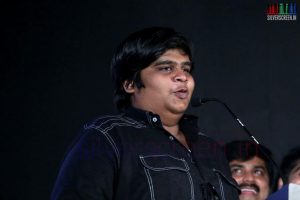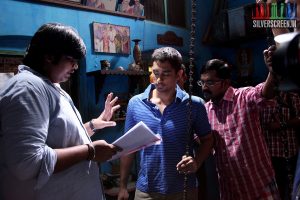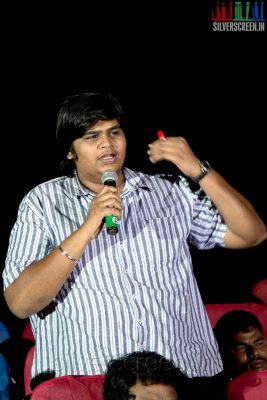
Director Karthik Subbaraj at Thottal Thodarum Audio Launch Function
He also has Thuru to his credit, though: funny, quirky, and quintessentially Karthik Subbaraj, with a trademark twist.
Karthik Subbaraj appears to be quite like his short films. His answers are crisp, and his tone brusque. He doesn’t readily offer something more, not a whisker. And when he does have something to say, Subbaraj states it blandly. There’s no underlying emotion, no hint of a smile; he barely laughs during our conversation. Not even when he narrates the tale behind Vijay Sethupathi’s name in Pizza. He was in Kodaikanal then, writing the movie’s script when a turkey called Michael caught his eye. “The bird used to respond to that name. He would screech whenever someone called him Michael,” Subbaraj recalls. So, Vijay Sethupathi became Michael. There’s nothing more to it; he had literally plucked the name out of thin air. He doesn’t explain any further.[quote align=’right’]In fact, I wanted to change Siddharth’s name lest people think it’s about me. Somehow, I never did.”[/quote]
That’s when we realise that his short films are in fact quite unlike him. There is more to them than meets the eye. Kaatchipizhai for instance, won rave reviews and gained him entry into Naalaya Iyakkunar – Kalaignar TV’s programme promoting young directors. It has a simple enough premise. Subbaraj’s eye traces the course of an airplane flying over many cities. He looks at the plane as it passes over Madurai, where a mother tries to coax her child to eat by showing him a plane. It then flies over Rameswaram, where a couple of school children are awed by a passing jet; and a lone youth who’s picking mangoes in a grove. The boy hears the roar of engines overhead, abandons his harvest, and runs for cover. The next time he catches up with it, the flight is passing over a hamlet in war-torn Sri Lanka. There’s nothing frivolous about it; but the underlying message is quite clear as well.
[quote align=’left’]I’m not writing fantasy, Subbaraj shrugs, nothing unusual. I would identify with the character at some point.[/quote]In Jigarthanda, Siddharth is called Karthik. Again, the christening was something organic, Subbaraj says, he simply wanted to name him Karthik. There’s nothing more to it. But he also insists the character doesn’t take after him. “In fact, I wanted to change the name lest people think it’s about me. Somehow, I never did.” But it’s not always that random, he adds. Karunakaran, for instance, reminded him of a friend whom he knew back in school; so he christened the actor after the friend. Subbaraj refuses to give us the moniker though. It’s a “patta peru”, he says. “I would give away the plot.” He’s not forthcoming with Lakshmi Menon’s name either. “And no, she is not an idli-seller. Her mother owns an idli kadai, but that’s just a small part of the movie, of no major influence.”

Jigarthanda-Working-Stills-starring-Siddharth-Lakshmi-Menon-Bobby-Simha-directed-by-Karthik-Subbaraj
[quote align=’left’]Subbaraj’s ring-back tone is this earworm from Jigarthanda: Pandi naatu kodyin mela…[/quote]“After writing it, I was waiting for a producer for a long time,” narrates Subbaraj, “I had several people who would agree to produce, we would make preparations to shoot, would begin pre-production and suddenly, the project will get dropped.” He remembers growing frustrated then; and one morning, he decided to just produce it himself – “with 5D, on a low budget.” That was when CV Kumar chanced upon the script – “he liked it, but he was looking to produce a small budget film.” Jigarthanda, Subbaraj adds, could never be contained within 2 crores; and nobody was willing to spend more on a first-time filmmaker. So, he wrote Pizza. That’s why, he explains, Pizza was mostly shot in a single location – the script was developed based on the budget and location constraints. And horror as a genre, would be quite perfect for this situation: a big house, with minimal lighting equipment.
But Subbaraj isn’t a fan of horror. He doesn’t enjoy it, he says. Apart from a handful of horror movies that friends had recommended, he hasn’t watched many.
There’s no scintillating tale behind Jigarthanda’s name either. Also, he hasn’t made a conscious effort to name his movies after food. “With Pizza, I couldn’t call it anything else. The name fit perfectly,” observes Subbaraj, “…and Jigarthanda also means cold-blooded. Cold-hearted. Eevu erakkame illadhavan. It gelled with the script; and the team liked it a lot.” The director had four other options as well – “but I don’t wish to reveal what they are; I am saving them for my upcoming films.” But isn’t Jigarthanda a “gangster musical” as well, we prod him. “There are some montages in the movie, especially when it moves from one phase to the other,” he elaborates, “Apart from songs, you can expect other OSTs. It was only when I finished writing the script that I realized that there were many montages. And I thought it would look good if I set them to music.”
[quote align=’right’]“I had several people who would agree to produce, we would make preparations to shoot, would begin pre-production and suddenly, the project will get dropped.”[/quote] Subbaraj is quite offhand about his choice of cast as well. He chose Siddharth because the actor “hadn’t done a role like this before”, and he roped in Lakshmi Menon because he “loved her recent movies”. Pizza had a good run in Telugu, so he decided to release Jigarthanda in the language as well, “also because Siddharth has a good market in that industry.” He invested a lot of time in research for the movie, reading up on gang-wars, and meeting people who gave him some inputs regarding the lives of gangsters. Subbaraj also says the movie tries to bust a few myths about Madurai; it showcases the city in a different light. “But I will know whether I have succeeded only post the release,” he declares grimly, “so, I don’t want to say anything more.” He also shot a few sequences in the area where he grew up. “We have filmed in almost every prime location in Madurai. In SS Colony and Arasar Adi, we shot some montages. We even filmed in those little hamlets around the city like Melur.”
For Pizza though, he read up on exorcism, explored haunted places and pored through horror books. His heroine in the movie was a horror novelist after all.

Director Karthik Subbaraj at the Sathuranga Vettai Audio Launch
Inspiration wasn’t hard to come by, he adds, for at that time, he used to “think a lot”. Only two of his short films were inspired by real-life incidents. Raavanam, which he produced for NI, was based on a tale that he had heard, about a cop who nabs a gangster in the wee hours of the morning; only to let him go when the latter threatens him. “He literally talks the cop out of it. But, we exaggerated a little in the movie,” he observes, “and changed the climax. It was something that did happen for real, though. And there is another one – Last Train – about a suicidal guy. Most of my work back then was message-oriented.” The rest of his scripts, though, are courtesy a fertile imagination. I’m not writing fantasy, Subbaraj shrugs, nothing unusual. I would identify with the character at some point because this would have definitely happened to someone somewhere.
[quote align=’left’]Subbaraj also says the movie tries to bust a few myths about Madurai; it showcases the city in a different light. “But I will know whether I have succeeded only post the release,” he declares grimly, “so, I don’t want to say anything more.” [/quote]Short films were a different ballgame, though – Subbaraj admits. He was producing them, for one. And budget constraints could often be overlooked. “I wouldn’t mind even if we overshoot the budget, but with feature films, we have to go by the producer’s dictate.” He learned it the hard way with Pizza. The producer wanted them to wrap up shoot within 33 days. “We did manage to do that in the end. But it was extremely difficult. That’s when I thought, if I probably had some experience, I would have requested for more time. I made sure that didn’t happen with Jigarthanda.” But Jigarthanda posed a different challenge, nevertheless. Pizza was made with Vijay Sethupathi in the lead, “he wasn’t a big hero then, and had a lot of time. But the second time around, I had to manage Siddharth’s call-sheet to avoid scheduling conflicts.” Both were “really cool actors though,” he adds in hindsight.
Subbaraj remembers being quite nervous when Pizza hit theatres. “When I tried to sell the movie, a lot of people said, ‘this looks like horror, but has a different ending. Not sure how it would be received’.” He recalls growing apprehensive then. “I was sure it won’t flop, but at the same time, I didn’t realise it would become this popular,” he says, “I gained some confidence only after watching the evening show on the first day. At AVM Rajeshwari, I saw a ‘house-full’ board. So, Vijay Sethupathi, Bobby Simha and I went in to watch. And from the driveway itself, we could hear the applause. The audience were enjoying themselves, and their reaction was uniform across all theatres. They gasped in fright and laughed at all the right intervals.”[quote align=’right’]Rendu kai rendu kaal illenaalum, indha Kaali pozhachuppaan da, he declares with a flourish.[/quote]
His parents were quite impressed too. “I don’t think they expected this from me,” Subbaraj observes wryly, betraying the first hint of a smile, “a few days before the release, I organized a screening for my mother. She is someone who’s quite open with her feedback. And she told me she got very frightened while watching it.” He remembers a couple of “negative reviews” that he had received as well – “they weren’t moved by the plot” – but admits the movie was a huge risk all the same. “We didn’t realise it at that time, though,” he says.
Madurai shaped much of Subbaraj’s childhood, and his career to an extent. He’s recognized in the city now. “We shot in Madurai for 60 days. And a lot of people would come up and talk to me then.” The city doesn’t figure in most of his works, though, he adds. “In Pizza, we had an introductory line about Michael – that he’s from Madurai; and Jigarthanda is based there. But apart from that, I haven’t drawn on it. There’s nothing about Madurai in my short films.” Having said that though, Subbaraj’s ring-back tone is this earworm from Jigarthanda: Pandi naatu kodyin mela...
Recommended
There wasn’t much to do in Madurai when Karthik Subbaraj spent his childhood there. There were no beaches; and weekends would invariably be spent visiting temples, and friends. Also, watching movies with family. Thalapathi and Annamalai were memorable experiences. Rajinikanth influenced him a lot, he says, the reason why he got into cinema. “Of course, I got to watch more serious films later and understood what it was all about; but Rajini was the initial attraction.” And even now, when he has some time on his hands, Subbaraj would watch Mullum Malaraum, a flick that he’s quite fond of. He loves Kaali’s “negative shades” and as a writer, quite likes the way the script was treated.
Rendu kai rendu kaal illenaalum, indha Kaali pozhachuppaan da, he declares with a flourish. That remains one of his favourite dialogues.
The Karthik Subbaraj interview is a Silverscreen Exclusive. His Jigarthanda releases tomorrow.
Coming up:
A “love-story” that he’s working on. “I may begin shooting in October.”


